World Public Opinion/PIPA
March 5, 2007
Full
Report (PDF)
Questionnaire/Methodology
(PDF)
 A majority of people polled for the BBC
World Service across 27 countries believe Israel and Iran have a mainly negative influence in the
world with almost as many saying the same about North Korea and the United States.
A majority of people polled for the BBC
World Service across 27 countries believe Israel and Iran have a mainly negative influence in the
world with almost as many saying the same about North Korea and the United States.
Respondents were asked to rate 12 countries – Britain, Canada, China, France, India, Iran, Israel, Japan, North Korea, Russia, the USA, Venezuela – and the European Union, as having a positive or negative influence.
Canada, Japan, the European Union, and France were judged most positively. Britain, China, and India received more positive than negative evaluations while Russia was viewed slightly more negatively than positively. Opinions about Venezuela were evenly divided.
(Details of the evaluations of the United States were released separately by the BBC on 23 January and are available here).
The BBC has been tracking opinions about countries' influence in the world over three years (2005 – 2007). During that time most ratings have remained relatively stable. There has been improvement in ratings of India, a slight decline in views about Britain and a significant fall in positive evaluations of the United States. Russia, China, and France also lost ground over the period, mainly between 2005 and 2006.
"It appears that people around the world tend to look negatively on countries whose profile is marked by the use or pursuit of military power," said Steven Kull, director of PIPA. This includes Israel and the US, who have recently used military force, and North Korea and Iran, who are perceived as trying to develop nuclear weapons."
"Countries that relate to the world primarily through soft power, like Japan, France, and the EU in general, tend to be viewed positively," he added.
GlobeScan president Doug Miller said: "India is the only country that has significantly improved its global stature in the past year, and is now even with China. Britain, while slipping a bit since 2005, appears to be avoiding the steep decline that its war partner, the US, is suffering. And it is fascinating that Chavez's Venezuela seems to be appealing to as many people as it is displeasing."
The poll was conducted for the BBC World Service by the international polling firm GlobeScan together with the Program on International Policy Attitudes (PIPA) at the University of Maryland. GlobeScan coordinated the fieldwork between November 2006 and January 2007. Each country's rating is based on half-samples.
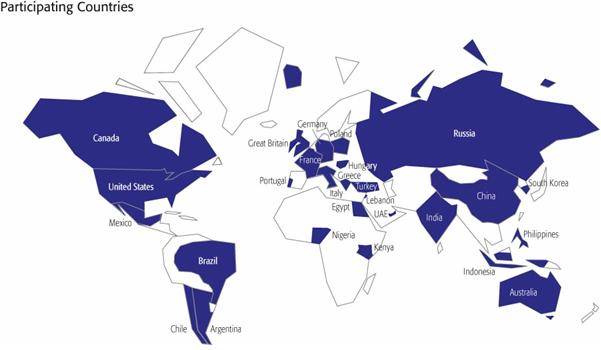
Global views of:
Israel, Iran, North Korea, United States, Japan, European Union, France, China, Britain, India, Russia, Venezuela
Israel
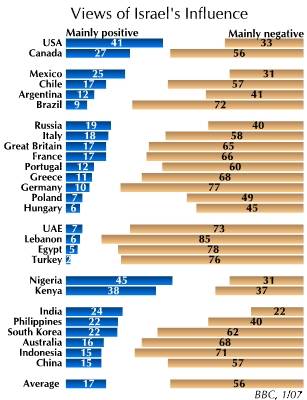
Israel is viewed quite negatively in the world, possibly because the poll was conducted less than
six months following the Israel/Hezbollah war in Lebanon. On average, 56 percent have a mainly
negative view of the country, and just 17 percent have a positive view, the least positive rating
for any country evaluated. In 23 countries the most common view is negative, with only two leaning
towards a positive view and two divided.
Unsurprisingly, the most negative views of Israel are found in the predominantly Muslim countries in the Middle East, with very large majorities in Lebanon (85%), Egypt (78%), Turkey (76%), and the UAE (73%) having negative views.
Large majorities also have negative views in Europe, including Germany (77%), Greece (68%) and France (66%). Indonesia (71%), Australia (68%) and South Korea (62%) are the most negative countries in the Asia/Pacific region. Brazilians (72%) are the most negative in Latin America.
The two countries that tend to view Israel positively do so in modest numbers. Forty-five percent of Nigerians and 41 percent of Americans have positive views of Israel's influence in the world, while nearly one-third in each country has negative views. The Kenyan and Indian populations have divided views of Israel.
Because this is the first time the survey has included Israel among the countries rated, there is no evidence that its current ratings are better or worse than before.
Iran
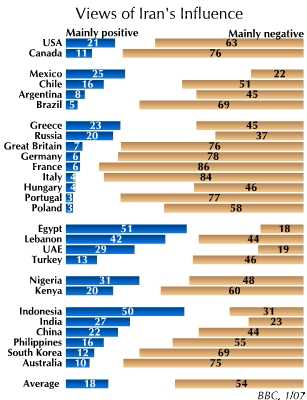
Iran continues to receive quite negative views worldwide, with the exception of some predominantly
Muslim countries. On average this year, a majority of 54 percent view Iran's influence negatively,
while just 18 percent say it has a positive influence.
Out of 27 countries, 21 view Iran negatively. Four countries lean positive and two others are divided. Among the 19 countries polled in both 2006 and 2007 the average views have remained essentially unchanged.
Countries in Western Europe and North America have the largest majorities expressing a negative view of Iran, though some have seen dramatic movements in opinion over the past year. Negative views among Americans have dropped sharply (81% to 63%) while negative views in France have jumped 18 points (68% to 86%). Large majorities in Italy (84%), Germany (78%), Portugal (77%), Canada (76%), and Great Britain (76%) have negative views of Iran's influence in the world. Widespread negative views are also found in Australia (75%), South Korea (69%) and Brazil (69%).
The positive views of Iran are primarily in the Muslim world where there have also been some dramatic positive movements over the least year. Positive views are found in Egypt (51% up from 38% in 2006) and Indonesia (50% up from 39% in 2006) with the UAE leaning positive (29%), but many not answering either way. Turks, however, have mostly negative views (46%) and have grown more negative by 13 percentage points over the last year. Indians lean slightly positive (27%) with many not answering.
Kenyans have grown sharply more negative with negative views rising from 37 to 60 percent. Negative views have also risen in Chile from 42 to 51 percent and in Nigeria from 40 to 48 percent, but have moderated in Argentina from 53 to 45 percent.
North Korea
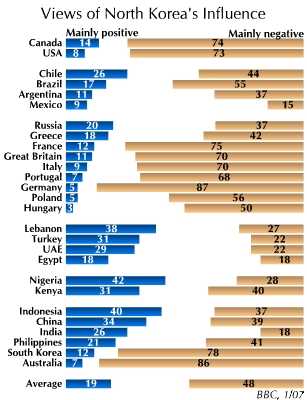
North Korea is also seen as a mainly negative influence in the world. Out of 27 countries polled,
20 have mostly negative views, while five lean towards seeing it positively, and two are divided.
On average, 48 percent see North Korea as a negative influence and 19 percent believe it has a
positive influence.
Some of the most negative views of North Korea can be seen in North America and Western Europe. Nearly three-quarters in Canada (74%) and the United States (73%) see North Korea as having a negative influence. An overwhelming majority in Germany (87%), France (75%), Great Britain (70%), Italy (70%), and Portugal (68%) have negative views of North Korea's influence in the world. In the Asia/Pacific region, Australians (86%) and South Koreans (78%) are also quite critical.
No country has a majority with a positive view of North Korea, but views lean slightly positive in a number of Muslim countries including Lebanon (38%), Turkey (31%), and the UAE (29%). Nigeria (42%) and India (26%), which have large Muslim populations, also lean positive. In general, Muslims throughout the world lean towards a positive view of North Korea (34% positive to 26% negative). This may be an expression of support for the way that North Korea has stood up to the US in regards to its nuclear program. Egyptians, however, are evenly divided (18% positive, 18% negative), with nearly two-thirds not taking a position. Indonesians are also divided (40% positive, 37% negative).
Two key countries that have often stood by North Korea also lean negative on its influence—Russia (37% negative, 20% positive) and China (39% negative, 34% positive).
United States
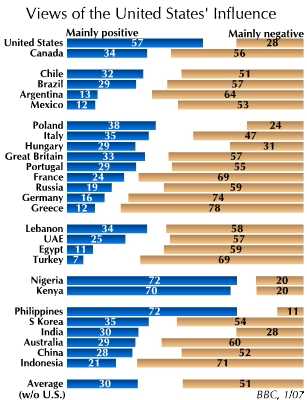
As reported earlier, worldviews of the United States continue to worsen, with most countries
having a largely negative view of the US. Across all 27 countries polled (excluding the US
self-evaluation), half (51%) now say the US is playing a mainly negative role in the world.
However, among the countries that on average are viewed negatively, the US has the largest
percentage—30 percent—saying it has a positive influence.
Across the 19 countries that have been polled for the last three years, the average percentage saying that the United States is having a mainly positive influence in the world has dropped six points from a year ago after having dropped four points from the previous year.
Among the 26 countries polled this time (excluding the US), in 20 the most common view of the United States' influence is negative, while in just four it is mainly positive and two are evenly divided. Negative views are particularly widespread in Europe (especially Greece 78%, Germany 74%, and France 69%) and predominantly Muslim countries (Indonesia 71%, Turkey 69%, Egypt 59%, and Lebanon 58%). The only countries with positive majorities are found in Africa (Nigeria 72%, and Kenya 70%), and the Philippines (72%).
Some of the sharpest drops in positive ratings over the last year have occurred in four countries that tended to be quite positive about the United States. Poland's positive ratings dropped 24 points, from 62 percent a year ago to 38 percent today. The Philippines dropped 13 points, from a very high 85 percent to a still-high 72 percent. India fell from 44 percent to 30 percent. And Indonesia plunged 19 points—from 40 percent to 21 percent positive—perhaps due to the waning of the positive effect of the American aid to Indonesian tsunami victims.
Additionally, the number of American respondents who believe the United States is having a positive influence in the world has also decreased six points, from 63 percent to 57 percent, and has dropped a total of fourteen points (from 71%) from 2005.
Japan
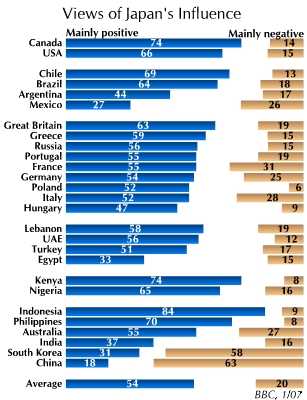
Japan remains one of the most positively viewed countries worldwide. On average this year, 54
percent gave Japan a positive rating, while just 20 percent say its influence in the world is
mainly negative. Out of 27 countries polled, 24 give Japan a positive rating, with just two giving
it a negative and one divided. Among the 19 countries polled in both 2006 and 2007, positive views
of Japan slipped slightly by 1 percentage point.
The two exceptions to this positive reputation for Japan continue to be its neighbours, China and South Korea, where majorities rate it quite negatively. Views are somewhat less negative in China compared to a year ago (71% down to 63% negative) and slightly more negative in South Korea (54% to 58% negative).
While the overall picture remained the same, positive views of Japan increased significantly in Turkey (42% to 51%), France (47% to 55%), Canada (62% to 74%), and Great Britain (57% to 63%); while positive views decreased somewhat in India (48% to 37%) and Brazil (73% to 64%).
In contrast to China and South Korea, other countries in the Asia/Pacific region have quite positive views of Japan including Indonesians (84%), Filipinos (70%) and Australians (55%). Indians also lean positive (37% positive to 16% negative).
Positive views of Japan's influence in the world remained largely steady among Americans (66%), Russians (56%), Germans (54%), and Italians (52%). Japan is also well-regarded in the Middle East, with majorities in Lebanon (58%), the United Arab Emirates (56%), and Turkey (51%) as well as a plurality in Egypt (33%) having positive views.
European Union (EU)
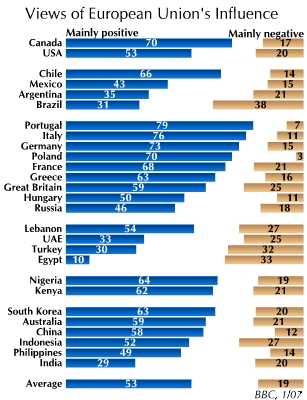
The European Union receives very positive ratings on its role in the world. Positive evaluations
of the EU are the most common view in 24 out of 27 countries polled, while in just two countries
the dominant view is negative and one divided. On average, 53 percent see the European Union
positively, while just 19 percent view it negatively, making it the most positively evaluated
international entity behind Canada and Japan. Among the 19 tracking countries, views of the EU
have been unchanged in aggregate, though specific countries have shown some substantial
shifts.
Unsurprisingly, the European Union is viewed very positively by the EU member countries that were polled, though some countries have more lukewarm views than others. Seventy-nine percent of Portuguese have positive views of the EU, as well as large majorities in Italy (76%), Germany (73%), Poland (70%) and France (68%). Smaller majorities are found in Greece (63%) and Great Britain (59%). The newest EU member polled, Hungary, gives it the lowest positive ratings (50%), but only 11 percent give a negative rating, while a large 39 percent do not take a position.
Positive views of the EU are not derived primarily from EU countries, however. When EU countries are excluded, the average rating is still 48 percent positive and 22 percent negative.
The EU is also highly regarded in North America, where positive views of its influence are widespread and improving. A large majority in Canada (70%, up from 51%) and a growing number in the United States (53%, up from 42%) give it positive reviews.
Attitudes about the European Union in Turkey are quite mixed and growing more negative, perhaps an indication of its struggles to become a member state. Turks are now evenly divided between positive views (30%, down from 40%) and negative views (32%, up from 16%), while a large number declined to answer either way.
Views of the European Union are mixed among the other three Middle Eastern countries polled. In Egypt and the UAE very large numbers do not take a position and those that do, lean to the negative: in Egypt, 33 percent negative and 10 percent positive; in the UAE, 33 percent negative and 25 percent positive. However, in Lebanon a clear majority (54%) rates the EU's influence positively (27% negatively).
Very positive views of the EU are found in Africa. Majorities in Nigeria (64%) and Kenya (62%) view the EU's influence as positive.
In the Asia/Pacific region, numbers are positive and improving in Australia (59%, up from 46%) and the Philippines (49%, up from 39%). Views are positive but declining in South Korea (63%, down from 71%) and India (29%, down from 37%) though many did not express an opinion. Views are positive and stable in China (58%) and Indonesia (52%).
Publics in Latin America also tend to view the European Union positively, though Brazilians are now the exception. The EU receives widespread positive evaluations among two-thirds (66%) in Chile, as well as in Mexico (43%) and Argentina (35%). More Brazilians, however, now view the EU's influence unfavorably. Thirty-eight percent say its influence is mainly negative, the highest out of any country, while just 31 percent view it as mainly positive (down from a 45% plurality a year ago).
Views in Russia are firmly positive with 46 percent saying that the EU is having a positive influence and just 18 percent saying it is having a negative influence.
France
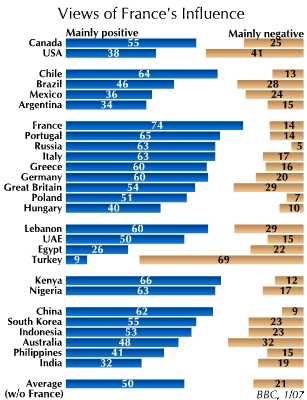
France continues to be viewed quite positively by the rest of the world, though less positively
than two years ago. The only country that does not view France's influence positively is Turkey,
while the United States is divided. On average, 50 percent see France as having a positive
influence in the world (21% negative).
The countries with the most positive views are found in most world regions: Kenya (66%), Portugal (65%), Chile (64%), Russia (63%), Italy (63%), Nigeria (63%), China (62%), Greece (60%), Germany (60%) and Lebanon (60%). Generally, views of France in Latin America tend to be more moderate, with pluralities having positive views of the country.
While average positive views of France dipped from 2005 to 2006, this year they have remained steady. However, this masks some sharp shifts in specific countries. Especially in some European countries, ratings of France have returned to the higher levels found in 2005, after the 2006 dip that may have been influenced by the widespread urban rioting in France that year. In Italy, 63 percent are positive (up from 50% in 2006); in Russia 63 percent have a positive view (up from 57% in 2006); and in Britain 54 percent now see France positively (up 19 points from the previous year). Other countries that warmed towards France in the past year are Canada (55%, up from 45%), Kenya (66%, up from 44%), Australia (48%, up from 41%) and Mexico (36%, up from 30%).
American views have also improved notably. Americans' negative ratings of France continue to drift downward from 52 percent in 2005, to 48 percent in 2006 and 41 percent in 2007. For the first time in three years views are now roughly divided (38% positive, 41% negative).
In some cases, views of France sharply worsened, most notably in Turkey, where negative views jumped from 39% in 2006 to 69%, likely due to the French government's opposition to Turkey joining the European Union. Positive ratings also declined in South Korea, dropping from a very high 74% in 2006 to 55%. Indians also show cooler attitudes towards France, falling from 42 to 32 percent positive, while negative views increased from 11 to 19 percent. In Brazil positive views dropped from 60 to 46 percent, but remain a plurality.
China
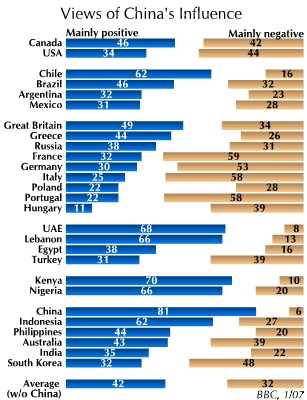
China continues to enjoy mildly positive ratings worldwide, with 16 out of 26 countries polled
this year (excluding China) having mainly positive views of its influence, nine having mainly
negative views and one divided. On average, China received a positive rating from 42% and a
negative rating of 32%. Following a sharp drop (8%) in the previous year, views of China on
average have remained largely stable over the past year among the countries polled in all three
years.
Positive views of China remain highest in African and some Middle Eastern countries. Majorities in Kenya (70%), the United Arab Emirates (68%), Lebanon (66%), and Nigeria (66%) view China positively. Interestingly, a plurality in Turkey (39%) sees China's influence as negative. Latin Americans tend to view China somewhat positively, with a majority in Chile (62%), and pluralities in Brazil (46%) and Argentina (32%) having this view, though Mexicans remain divided in their views of China.
The most negative views are found in Europe and the US. Of the nine European countries polled, six view China negatively including majorities in France (59%), Portugal (58%), Italy (58%) and Germany (53%). Among Americans 44 percent see China as mostly negative while 34 percent see it as positive. Britons, however, now lean positive on China (49% positive to 34% negative).
A few dramatic changes occurred over the last year. Britons went from leaning slightly negative to leaning mainly positive with a nine point increase in positive views. Russia went from being divided to leaning positive (up six points). Canadians slightly reversed their downward trend from the previous year, and now a plurality (46%) views China positively, up from 36% the previous year. American views of China are slightly less negative than a year earlier, falling from 53 percent in 2006 to 44 percent today, but positive views held steady at 34 percent.
Average ratings of China in the Asia/Pacific region also remained stable overall, with only slight shifts in views. In terms of individual countries, negative views of China in South Korea dropped from a majority to a plurality (58% to 48%), however positive attitudes fell dramatically in the Philippines (54% to 44%) and India (44% to 35%). Attitudes about China remained steady in other countries in the Asia/Pacific region, with Indonesians (62%) and to some extent Australians (43%) continuing to see China's influence as positive.
Britain
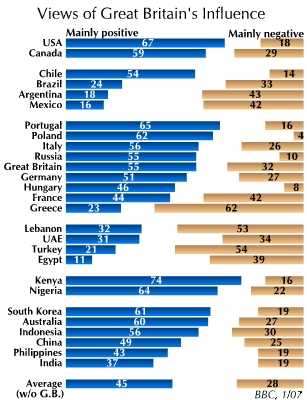
Though still largely positive, views of Britain appear to be slipping towards the negative in a
number of countries. Overall, 17 countries out of 26 polled have positive views of Britain, while
just seven have negative views and two are divided. Among all countries polled (excluding
Britain), an average of 45 percent have a positive view, while 28 percent have a negative
view.
Among the 19 countries polled the last three years, positive views have slipped from 50 percent in 2005 to 46 percent, perhaps due to Britain's continuing involvement in the unpopular Iraq war. Most significantly, views of Britain plummeted in Brazil, dropping from 49 percent in 2006 to 24 percent today, with a plurality of 33 percent now holding a negative view of its influence. In France positive views have slipped from 50 percent last year to 44 percent today, while negative views jumped from 32 to 42 percent. In Turkey negative views grew from 41 to 54 percent. In Lebanon, as compared to 2005, negative views jumped from 34 to 53 percent. Those who still view Britain quite positively, but have seen decreases over the past year include South Korea (75% to 61%), Nigeria (75% to 64%), and Poland (72% to 62%).
Majorities continue to view Britain positively in the United States (67%), Portugal (65%), Australia (60%), Canada (59%), Italy (56%), and Indonesia (56%). Positive views are up among Kenyans (60% to 74%), Russians (45% to 55%) and Germans (43% to 51%).
India
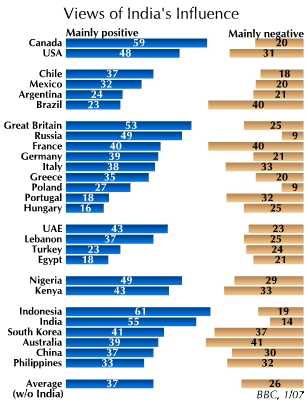
India's image appears to be improving significantly in some regions of the world, though in many
countries numbers are divided with many not providing a judgment one way or the other. Out of the
26 countries polled in the current year (excluding India), 17 give it a positive rating while only
3 give it a negative rating and 6 countries show divided opinions. On average, 37 percent view its
influence positively, 26 percent negatively, and 37 percent do not give an answer.
The strongest positive views can be found in Indonesia (61%), Canada (59%), Great Britain (53%), Russia (49%), Nigeria (49%), and the US (48%). Only three countries lean to a negative view and all of these do so with fairly small numbers: Brazil (40%), Portugal (32%), and Hungary (25%).
Of the 19 countries polled in the previous cycles, on average, positive opinion has increased from 34 to 39 percent. The number of countries with positive views of India has grown from 9 to 12. Four out of the five countries that leaned negative in 2006 now have divided views of India.
Positive opinion of India in North America and some European countries has grown significantly over the past year, with substantial jumps in positive views in Canada (34% to 59%), France (27% to 40%), Germany (30% to 39%), the United States (38% to 48%), and Italy (31% to 38%).
In the Asia/Pacific region there have been some sharp changes. Positive views increased in Indonesia (50% to 61%) and two countries that had somewhat negative views warmed considerably. While Filipinos had 57 percent expressing negative views last year, this has now dropped 25 points, so that views are now divided. Among South Koreans negative views dropped from 47 to 37 percent.
Indians also rate themselves more highly than the previous year, moving from 47 percent to 55 percent who view their country's influence positively, though Indians remain lukewarm about themselves in comparison to most other countries.
Russia
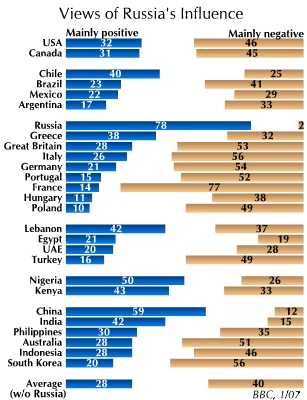
Russia's influence in the world continues to be viewed as largely negative, with views becoming
more negative, especially in European countries—presumably a response to some of the energy
and industrial policies of President Vladimir Putin. Out of the 26 countries polled this year
(excluding Russia), 18 have negative views of Russia's influence in the world, while seven
countries have positive views and one is divided. On average 28 percent view Russia as having a
positive influence, while 40 percent see it as having a negative influence.
Among the 19 countries polled three times since 2005, average positive evaluations, after dropping from 37 to 29 percent last year, have remained largely stable (27%) this year. Negative views after staying steady last year at 40 percent have increased slightly to 43 percent.
The only country that continues to have a majority positive view of Russia is China with 59 percent (12% negative). Fifty percent of Nigerians hold a positive view.
Europeans have become more negative towards Russia in the past year with negative views growing in France (77%, up from 62%), Italy (56%, up from 45%), and Germany, (54%, up from 45%). Negative attitudes about Russia in South Korea grew to a majority (48% to 56%), as well as in Australia (43% to 51%). Americans' negative views are also up (40% to 46%). Additionally, a growing plurality in Turkey (38% to 49%) has a negative view of Russia's influence.
A few countries have shown some improvements in attitude. Filipinos reversed the dramatic increase in negative attitudes about Russia from the previous year, with negative attitudes dropping from 52 to 35 percent. Positive views are also up among Kenyans (28% to 43%).
Venezuela
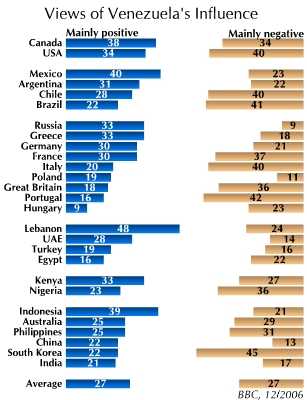
Overall world public opinion is closely divided about Venezuela, led by the charismatic but
polarizing Hugo Chávez. Of the 27 countries polled, in 13 countries the most common view of
the oil-rich Latin American nation is mainly positive, while in 13 others the dominant view is
mainly negative and one country is divided. On average, equal numbers (27% each) see Venezuela as
having a positive or negative influence, with 46 percent declining to offer an opinion. In no
country does a majority hold a positive or a negative view and in most cases the divide is quite
narrow.
This divided attitude towards Venezuela is spread across nearly all regions. Its fellow Latin American nations are divided: While positive views are held by pluralities of Mexicans (40%) and Argentineans (31%), negative views of their neighbour are held by pluralities of Chileans (40%) and Brazilians (41%). In Europe, small pluralities of Russians (33%), Greeks (33%), and Germans (30%) have favourable views while pluralities of Portuguese (42%), Italians (40%), French (37%), and Britons (36%) have unfavourable views. In the Asia/Pacific region, South Koreans are the most negative (45%) of all countries, along with pluralities in the Philippines (31%), and Australia (29%). However pluralities in Indonesia (39%) and India (21%) lean towards a positive view.
Surprisingly, given the criticism of President Chávez by American leaders, only a modest plurality of Americans (40%) have a negative view of Venezuela, while nearly as many (34%) have a positive view.
Commentary:
